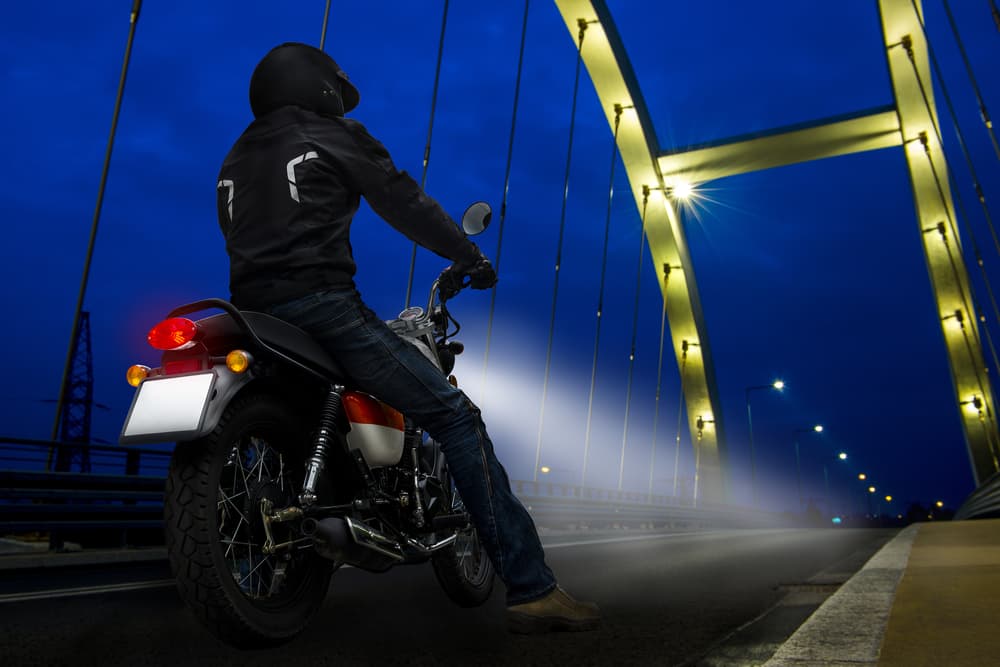For bikers, visibility isn’t just important; it’s life-saving. Changes to West Virginia motorcycle LED light laws may help to limit the frequency and severity of accidents, but they also have implications for personal injury cases involving bikers.
Insights from experienced motorcycle accident lawyers can provide the knowledge needed to ride safely while protecting your right to compensation if a negligent driver causes you harm. Are you prepared for the worst? Find out below.
Why Visibility Matters for Motorcyclists
The greatest danger motorcyclists face is not being seen by other drivers. Poor visibility plays a role in nearly 40 percent of fatal motorcycle accidents in the United States. Limited visibility, whether due to weather, lighting, or the size of motorcycles, can create catastrophic and legally complex situations.
Here are some of the most common types of accidents where visibility is a factor:
- Left-Turn Collisions: These accidents can cause injuries ranging from broken bones to traumatic brain injuries. Legally, proving the driver failed to yield can be challenging, especially if visibility was poor at the time.
- Rear-End Accidents: Motorcycle riders can be thrown into traffic when a car rear-ends them. These accidents often lead to spinal cord damage or internal injuries. Insurance companies may argue the rider’s brake lights weren’t visible, complicating claims.
- Blind Spot Crashes: Drivers failing to check their blind spots can collide with motorcyclists while changing lanes. This type of crash frequently leads to road rash, fractures, or worse. Riders often face uphill battles proving negligence, especially in dense traffic conditions.
- Head-On Collisions: Poor lighting or low reflectivity can make motorcycles nearly invisible to oncoming traffic. These accidents are usually fatal, leaving families to fight for justice in emotionally charged wrongful death claims.
Each of these scenarios highlights how visibility issues not only lead to devastating injuries but also introduce unique legal hurdles for motorcyclists seeking fair compensation. Understanding state-specific lighting regulations is crucial, as laws vary and can affect safety and liability.
What You Need to Know About West Virginia Motorcycle LED Light Laws
West Virginia’s motorcycle lighting laws changed in 2014 with the introduction of House Bill 2477. Before this bill was passed, motorcyclists faced potential legal trouble for adding extra decorative or safety-focused lights. Now, riders are allowed to install auxiliary lighting under specific conditions:
- Types of lighting allowed: Auxiliary lighting can include amber or white lights. These may be standard motorcycle light bulbs, LED light strips, or pods.
- Placement: Lights must be directed toward the engine or drivetrain. This prevents glare or distractions for the rider and ensures that other drivers can still see the lights without being blinded.
- Prohibited features: The lights must be steady – no blinking, flashing, or oscillating. This avoids confusion with emergency or law enforcement vehicles.
The update in the law came about after grassroots efforts by motorcyclists who argued for safer visibility on West Virginia roads. One bike shop owner collected over a thousand signatures to support the bill. His efforts echoed a concern that countless bikers have raised nationwide: visibility equals safety. What he may not have realized is that it also equals increased chances of protecting your rights in the event of a motorcycle accident.
The Relationship Between LED Lighting and Motorcycle Accident Cases
While the law allows for additional lighting to prioritize safety, what happens if an accident still occurs? This is where motorcycle LED light regulations intersect with personal injury cases.
Negligence and Visibility
Visibility plays a critical role in proving negligence. By adding legal, properly installed lighting, you demonstrate that you took reasonable precautions to remain visible on the road. Here’s why this matters in legal cases:
- Countering excuses: Enhanced lighting can make it more difficult for other drivers to argue they couldn’t see you.
- Strengthening your claim: Showing you followed safety standards helps support the argument that the crash was caused by the other driver’s negligent, reckless, or careless actions.
- Highlighting responsibility: Being proactive about visibility reflects positively on your commitment to safe riding, which may help protect you when false narratives from insurance companies or the at-fault party threaten to diminish or deny the compensation you deserve.
Implementing the changes allowed in West Virginia motorcycle LED light laws could ultimately help your personal injury lawyers demonstrate negligence on the other driver’s part and support a strong claim for compensation should an accident occur.
How Non-Compliance Can Hurt Your Case
Enhanced visibility may save lives and legal headaches, but using non-compliant lighting could work against you. States like West Virginia have specific regulations for auxiliary lights. Stray from those, and you may inadvertently complicate your case in ways that include:
- Blame shifting: If your bike has distracting, flashing, or multicolored lights, a defense attorney might argue that you caused confusion or contributed to the crash.
- Credibility issues: Non-compliance may be used to question your judgment as a rider, undermining your claim.
- Reduced fault for other drivers: A judge or jury might assign you partial blame, reducing your compensation.
To protect yourself, ensure your lighting choices comply with West Virginia motorcycle LED light laws. For example, West Virginia allows stationary amber or white lights, but anything beyond that could become a legal liability.
Impact on Insurance Claims
 Compliant lighting enhances visibility and could strengthen your position when your lawyer negotiates with insurers. Keep these points in mind when dealing with claims:
Compliant lighting enhances visibility and could strengthen your position when your lawyer negotiates with insurers. Keep these points in mind when dealing with claims:
- Improved credibility: Legal lighting shows you prioritized safety, making it harder for insurers to dispute your claim.
- Minimizing disputes: Non-compliance gives insurers an opportunity to deny or reduce your compensation.
- Stronger leverage: Following state laws builds a strong case for fair treatment during negotiations with your motorcycle accident attorney.
Understanding and complying with state-specific lighting laws goes beyond safety. It’s about protecting your legal rights and ensuring you’re in the best position to recover the compensation you deserve if the unthinkable happens.
Why Legal Representation Matters No Matter What Motorcycle Lights You Have
While adequate lighting enhances visibility and reduces certain risks, it’s not a complete safeguard. Riders still encounter significant obstacles on the road and in the courtroom, which underscores why having a skilled lawyer can make a world of difference.
The Complexities of West Virginia’s Motorcycle Laws
West Virginia requires all motorcyclists to adhere to strict helmet laws and safety standards, including wearing helmets that meet federal regulations and using proper eye protection. While these measures are crucial for safety, they don’t eliminate the vulnerabilities riders face due to the lack of physical protection a motorcycle provides.
Injuries from accidents are often severe, leading to high medical costs and extended recovery periods. Additionally, the state’s fault laws follow a comparative negligence system, meaning your compensation can be reduced if you are found partially at fault. Navigating these laws without guidance is overwhelming and can severely impact your claim.
Bias Against Motorcyclists
Motorcyclists frequently deal with unfair stereotypes, such as the perception that they are reckless or hard to see. This bias can influence insurance adjusters, witnesses, and even juries. For example, an opposing party might argue that you were speeding or weaving through traffic, even if you were following all traffic laws.
Experienced attorneys can work to counter these misconceptions by demonstrating you were a responsible rider taking necessary precautions, such as complying with lighting regulations and wearing proper safety gear.
The Financial Toll of Motorcycle Accidents
The costs associated with a motorcycle accident can be staggering. Immediate expenses like emergency care, surgeries, and hospital stays can quickly add up to tens or hundreds of thousands of dollars in upfront medical expenses.
Beyond these initial monetary losses, long-term expenses—including rehabilitation, lost wages, and ongoing therapy—can create millions of dollars in lifetime care costs. Unfortunately, motorcycle riders often underestimate the lifetime impact of these injuries.
A lawyer can help ensure you pursue every avenue of compensation, from current medical bills to estimated future needs, protecting you from being financially overwhelmed.
How to Protect Yourself Legally and Financially After a Motorcycle Accident
 LED lights or not, there are many steps you should take after a motorcycle accident to protect yourself legally and financially, including but not limited to:
LED lights or not, there are many steps you should take after a motorcycle accident to protect yourself legally and financially, including but not limited to:
- Call a personal injury lawyer: Time is of the essence after a motorcycle accident. Consulting with a lawyer as soon as possible ensures you don’t miss important deadlines to file a claim or lawsuit. The sooner a lawyer gets involved, the faster they can start building a strong case for the compensation you deserve.
- Document the scene: If you can, take pictures of the accident scene, including road conditions, vehicle damage, skid marks, and any visible injuries. This evidence can play a critical role in proving fault and strengthening your case.
- Seek additional medical attention: Even if you feel fine, getting evaluated by a medical professional ensures any hidden injuries, like internal trauma or a concussion, are identified and documented. Medical records are also vital for your legal claim.
- Gather witness information: If there were bystanders who saw the accident, ask for their names and contact details. Witness testimony can provide an extra layer of support for your claim.
- File a police report: Ensure that the accident is reported to the police. A formal police report is an important document that insurance companies and courts often rely on during the claims process.
- Notify your insurance company: Promptly inform your insurance provider about the accident. When describing what happened, stick to the facts and avoid admitting fault, as this could hurt your claim.
- Keep detailed records: Track all expenses related to the accident, including medical bills, repair costs, lost wages, and any out-of-pocket expenses. A comprehensive record helps maximize the compensation you’re entitled to receive.
While these steps are crucial, it’s understandable that you may not be able to complete them all after a serious accident. That’s okay. An experienced lawyer can handle these tasks on your behalf, using every resource available to build a strong case. That’s the advantage of having legal representation—you gain an advocate who will ensure nothing is overlooked while you focus on your recovery.
West Virginia Motorcycle LED Light Law FAQs
Are LED lights on motorcycles legal in West Virginia?
Yes, but there are specific requirements. West Virginia allows auxiliary lighting like stationary amber or white LED lights. These lights must be directed at the engine or drivetrain and cannot blink, flash, or oscillate. Non-compliance with these laws can lead to fines and may complicate legal cases if an accident occurs.
Can improper motorcycle lighting affect my accident claim?
If your motorcycle lighting does not meet the legal standards, it could be used against you in insurance or legal claims. For example, non-compliant flashing or multicolored lights might allow the other driver to argue that your lighting contributed to the accident, potentially reducing your compensation.
How can legal LED lighting help prove negligence in an accident?
Properly installed and compliant lighting demonstrates that you took reasonable steps to remain visible. If another driver claims they “didn’t see you,” having legal LED lights shows you prioritized safety, making it easier to prove negligence and strengthen your case.
What should I do if I’m unsure my LED setup complies with state laws?
If you’re uncertain, you should review West Virginia’s motorcycle lighting laws or consult with an expert at a local bike shop. Better yet, an attorney experienced in motorcycle cases can provide guidance to ensure compliance and protect your legal standing in case of an accident.
Why is understanding LED light laws important for motorcyclists?
Complying with LED lighting laws helps improve your safety on the road and plays a crucial role in protecting your legal rights. Being informed and compliant can prevent issues with insurance claims or lawsuits, ensuring you’re in the strongest position to seek fair compensation if you’re involved in an accident.
What Can You Do Next To Protect Your Rights After A Motorcycle Accident?
Does your motorcycle lighting comply with state regulations? If you’re unsure, it might be time to review the requirements. And if you’ve been in an accident and wonder how your lighting setup or other factors may impact your case, it’s worth speaking with an experienced personal injury attorney.
Are you ready to learn more about your legal rights after a motorcycle accident? Contact Robinette Legal Group, PLLC, online or at (304) 594-1800 to explore your options. Safe riding starts with being informed, and we’re here to help you take the first step toward securing the justice you deserve.
Jeffery Robinette was admitted to practice law in 1991 and is licensed in all levels of state and federal trial courts in West Virginia. Mr. Robinette is also licensed in all state and federal appeals courts in West Virginia and the United States Supreme Court. As a National Board Certified Trial Attorney who has handled hundreds of motor vehicle, injury, and construction defect claims and a leading author on insurance claims settlement issues and difficulties in West Virginia, Jeff Robinette is uniquely qualified to represent your best interest.





